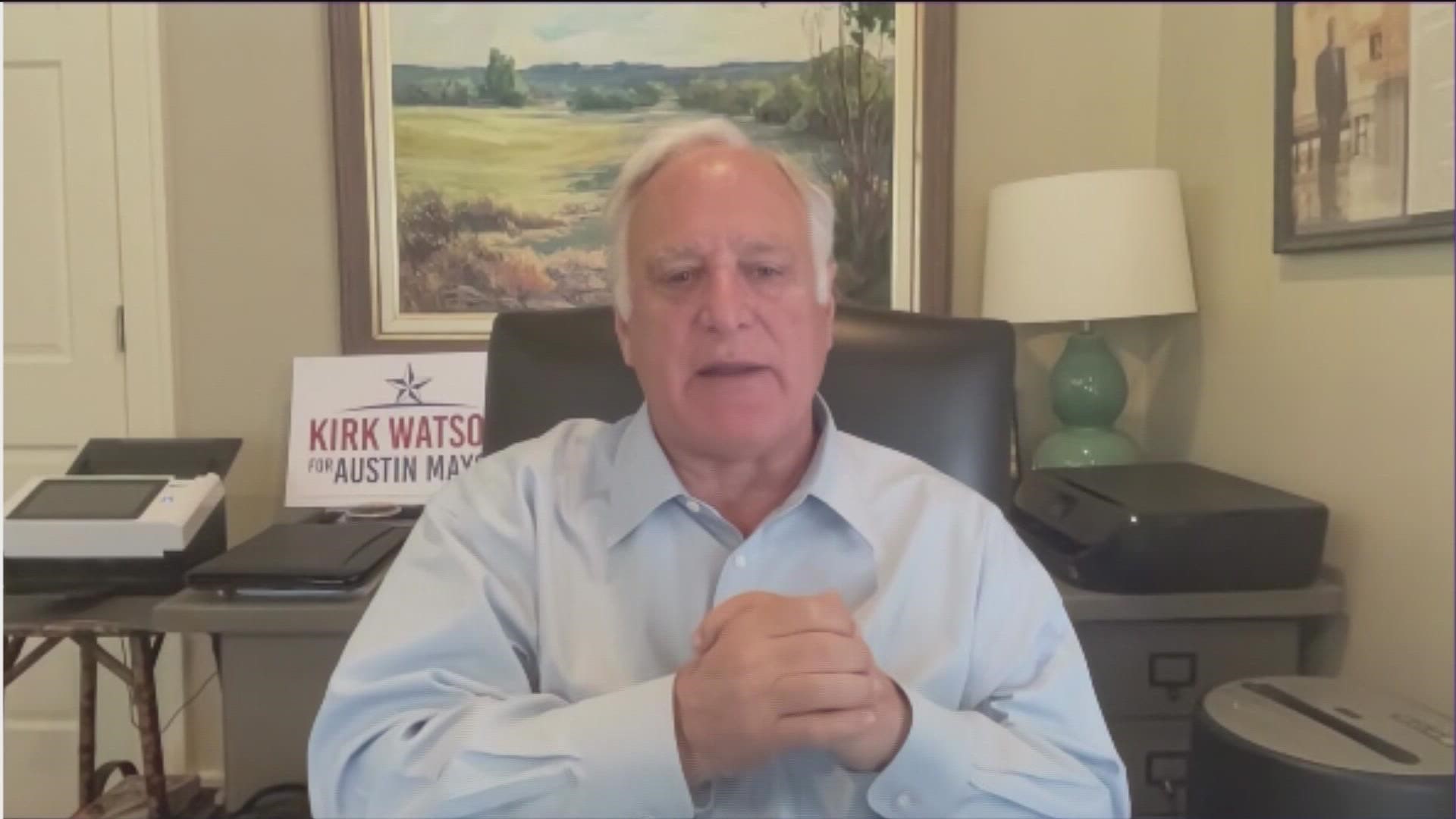AUSTIN, Texas — Austin voters have chosen Kirk Watson as their next mayor, in a tight race decided by a few hundred votes.
In November, neither Watson nor State Rep. Celia Israel received more than 50% of the vote in the race for Austin mayor, forcing a Dec. 13 runoff.
On Tuesday, Watson was behind Israel by just 17 votes in Travis County, with 50.01% voting for Israel and 49.99% voting for Watson. In Williamson County, Watson won 62% among city of Austin voters, bringing him to the lead by 886 votes.
Just under 18% of registered Travis County voters participated in the mayoral runoff.
In a victory speech on Tuesday night, Kirk Watson said, "It means a lot to me to know that Austinites in every part of this city still want the leadership I have tried to deliver."
“On behalf of the entire City of Austin government I would like to offer our warmest congratulations to our newly elected mayor and new and returning councilmembers,” said City Manager Spencer Cronk. “Their commitment to representing our community is the cornerstone of our democracy and provides such an important link between government and the people. City staff will be working to give our newly elected officials the support they need to get to work from day one.”
Watson previously served as mayor of Austin from 1997 until 2001. In 2002, he ran for Texas attorney general and lost to Greg Abbott.
Watson spent 13 years in the Texas Senate, to which he was elected from 2007 to 2020 before he retired to become the first dean of the University of Houston’s Hobby School of Public Affairs. He announced he would make his return to politics and again run for mayor of Austin in February of this year.
Watson graduated from Baylor University and ranked first in his class at Baylor Law School, according to his campaign website.
On his site, Watson says that his experience leading Austin for just over four years, in addition to his time in the Texas Legislature, proves that he is “successful in getting things done and creating transformational change.” His main priorities include the city’s rising cost of living, homelessness, systemic racism and transportation.
During KVUE and the Austin American-Statesman’s mayoral debate on Oct. 18, Watson was asked what he would have done differently when he was mayor of Austin. He said some of his policies led to the ongoing gentrification in East Austin that is pushing out long-time Black residents.
During that debate, Watson also answered questions about some other hot topics in Austin. On the subject of policing, he said that everyone should feel safe, including those needing the police and those interacting with officers. He believes this can be achieved with a fully staffed police force.
When asked whether the City of Austin should be housing people experiencing homelessness in hotels, Watson said if hotels “can play a role,” but that they should not be the only housing method for unhoused residents. During KVUE’s mayoral runoff debate on Dec. 5, Watson further detailed his thoughts on enforcing the city’s public camping ban and addressing homelessness in the city.
“We’re going to have to have places where you can send people. So, the first tangible step needs to be for us to get out of the habit we've got at City Hall of all or nothing. You can camp anywhere you want to camp any time of day with no responsibility or permanent supportive housing because we have to enforce the camping ban,” Watson said. “So, we're going to have to figure out where you can put some sanctioned campsites. We're going to have to put into place more non-congregate shelters where people that don't want to be congregated together have the ability to be in shelters ... it's impossible to enforce a camping ban when you have not done the work necessary to have a place for people to go."
Back in July, Watson outlined a plan to address the city’s overall unaffordability problem.
As for transit issues, Watson has said the City needs better coordination between various traffic authorities, including the Texas Department of Transportation, Travis County and toll operators. On the subject of ensuring residents get what they voted for with Project Connect, Capital Metro’s widespread public transit plan, Watson said he wants to “learn from the past” after a rail project failed in 2000.
During the Dec. 5 debate between Watson and Israel, Watson also detailed his vision for improving Interstate 35.
"My vision has four parts to it. One is, it's a bad road, functioning as a bad road. Traffic, we all know the congestion on I-35, and about 80% of the commute of the cars that are on I-35 going through Central Austin originated in the Austin area. My vision is that we do the things that we need to do in order to make it operate better as a road. Things like managed lanes so that you'll be able to have cars moving easier, both on the current light-type lanes and the new lanes. Second, it needs to be better for transit. Again, that is something that managed lanes can help us with because what the managed lanes will help us do I, like on MoPac, where we have that managed lane, you can use Rapid Bus better,” Watson said. “The third thing that I would say it needs to have is we need to make it be something that is safer. We have to have greater safety. It is a deadly road. The final thing is that it needs to be something that benefits Austin by being better, looking better, having caps, that sort of thing. And we can do all of that, I think."
Austin mayoral terms last two years. Watson will be sworn in on Jan. 6.

